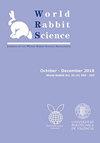补锌日粮雄性兔精液指标、生长反应和精子储备
IF 1.3
4区 农林科学
Q3 AGRICULTURE, DAIRY & ANIMAL SCIENCE
引用次数: 2
摘要
本试验旨在研究饲粮锌水平对异种公兔精液指标、生长参数和睾丸精子储备的影响。试验选用6月龄雄性家兔20只,随机分为4组,每组5只,分别饲喂葡萄糖酸锌添加量为0、50、100和150 mg / kg的饲粮,为期8周。每周用人工阴道采集雄鼠精液,评估精液量(mL)、精子活力(%)、精子浓度(×10 8 /mL)和活精子细胞(%)。离心分离精浆,原子吸收光谱法测定精浆中锌的浓度。每周测量雄性体重,记录日采食量。饲喂试验结束后,将家兔击昏并屠宰;仔细地去除睾丸和附睾并均质化,使用标准程序测定精子储量。结果表明,饲料中葡萄糖酸锌水平对精液指标影响不显著。与对照组相比,饲喂每公斤100和150毫克锌的雄性精液锌浓度显著高于对照组。饲粮中添加50 mg葡萄糖酸锌/ kg的雄性体重增加(454±50.3 g),睾丸重量增加(6.23±0.25 g),附睾重量增加(1.63±0.59 g)。饲粮补充锌对睾丸精子储备无显著影响。每公斤添加100和150毫克葡萄糖酸锌的雄鼠附睾精子储备显著增加。综上所述,饲粮中添加葡萄糖酸锌并不能改善热带地区异种雄性兔的精液质量和生长指标,但可以提高精液锌浓度,从而改善其前列腺健康状况。本文章由计算机程序翻译,如有差异,请以英文原文为准。
Semen indices, growth response and sperm reserve of male rabbits fed zinc supplemented diets
This study was carried out to assess the effect of dietary levels of zinc on semen indices, growth parameters and testicular sperm reserve of heterogeneous stock of male rabbits. Twenty male rabbits aged 6 mo old were randomly allotted to four groups of five males each and fed diets containing 0, 50, 100 and 150 mg of zinc gluconate per kg diet, respectively, for eight weeks. Semen was collected from the males weekly using an artificial vagina and semen volume (mL), spermatozoa motility (%), sperm concentration (×10 8 /mL) and live sperm cells (%) were assessed. Seminal plasma was separated from the semen by centrifugation, and its zinc concentration was determined using atomic absorption spectrometry. The weights of the males were taken weekly, and the daily feed intake was recorded. At the end of the feeding trial, the rabbits were stunned and slaughtered; the testes and epididymis were carefully removed and homogenised to determine sperm reserves using standard procedure. The result showed that semen indices were not significantly influenced by the dietary levels of zinc gluconate. Seminal zinc concentration was significantly higher in males fed 100 and 150 mg of zinc per kg compared to those in the control group. A higher body weight gain (454±50.3 g), testes weight (6.23±0.25 g) and epididymis weight (1.63±0.59 g) was recorded in males fed diet supplemented with 50 mg of Zinc gluconate per kg. No significant effect of dietary zinc supplementation was recorded in testicular sperm reserve. Epididymal sperm reserve was significantly higher in males fed the diets including 100 and 150 mg of zinc gluconate per kg. In conclusion, dietary levels of zinc gluconate did not improve semen quality and growth indices but increased seminal zinc concentration, which could result in improved prostate health in the heterogeneous stock of male rabbits in the tropics.
求助全文
通过发布文献求助,成功后即可免费获取论文全文。
去求助
来源期刊

World Rabbit Science
农林科学-奶制品与动物科学
CiteScore
1.70
自引率
25.00%
发文量
22
审稿时长
>36 weeks
期刊介绍:
World Rabbit Science is the official journal of the World Rabbit Science Association (WRSA). One of the main objectives of the WRSA is to encourage communication and collaboration among individuals and organisations associated with rabbit production and rabbit science in general. Subject areas include breeding, genetics, production, management, environment, health, nutrition, physiology, reproduction, behaviour, welfare, immunology, molecular biology, metabolism, processing and products.
World Rabbit Science is the only international peer-reviewed journal included in the ISI Thomson list dedicated to publish original research in the field of rabbit science. Papers or reviews of the literature submitted to World Rabbit Science must not have been published previously in an international refereed scientific journal. Previous presentations at a scientific meeting, field day reports or similar documents can be published in World Rabbit Science, but they will be also subjected to the peer-review process.
World Rabbit Science will publish papers of international relevance including original research articles, descriptions of novel techniques, contemporaryreviews and meta-analyses. Short communications will only accepted in special cases where, in the Editor''s judgement, the contents are exceptionally exciting, novel or timely. Proceedings of rabbit scientific meetings and conference reports will be considered for special issues.
World Rabbit Science is published in English four times a year in a single volume. Authors may publish in World Rabbit Science regardless of the membership in the World Rabbit Science Association, even if joining the WRSA is encouraged. Views expressed in papers published in World Rabbit Science represent the opinion of the author(s) and do not necessarily reflect the official policy of the WRSA or the Editor-in-Chief.
 求助内容:
求助内容: 应助结果提醒方式:
应助结果提醒方式:


